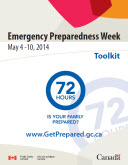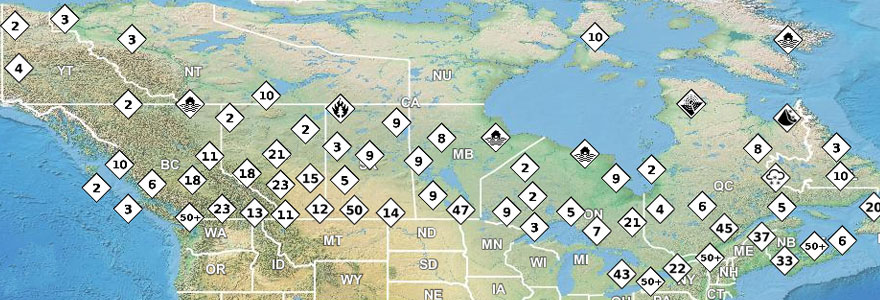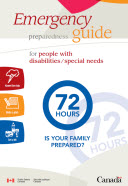How Canadians Can Help-During Major Disasters and Other Emergencies Abroad
Canadians feel strongly about helping to support communities affected by natural disasters and other emergencies abroad.The best way to help: Donate money - not clothing or food - to experienced humanitarian organizations.
- Why should you donate cash instead of goods?
- Why do governments and relief agencies discourage donations of food, clothing and other goods?
- You have already collected goods that you want to donate. What should you do with them?
- You want to volunteer in the affected country. What can you do?
- You are interested in helping here in Canada. What can you do?
- You want to help beyond the relief phase. What can you do?
- Where may you find information about experienced humanitarian organizations?
Why should you donate cash instead of goods?
Because cash donations are quick, efficient and adaptable.- Cash donations are the fastest, most efficient way to get help to people living in a disaster zone. They allow relief agencies to purchase quickly supplies based on the specific needs of the affected population.
- Cash donations allow relief agencies to purchase goods and services in the
affected country or neighbouring areas. Your financial contribution in other words, is helping to
- get aid to affected populations as quickly as possible, and
- regenerate the local economy, which may have been seriously affected by the disaster.
- In most cases, it is more cost-effective to purchase goods locally than to airlift supplies from far away, as fuel and aircraft costs can be very high. In addition local goods can be purchased in much less time than it takes to organize the logistics of an airlift from a distant country.
- Culturally familiar goods can respond to humanitarian needs, as well as provide a small sense of comfort or normalcy to traumatized and displaced populations, which foreign, unfamiliar goods may not.
Why do governments and relief agencies discourage donations of food, clothing and other goods?
Because cash donations are more useful.- Relief workers on the ground can lose valuable time sorting through unmarked or inaccurately labelled boxes of privately donated goods when the necessary supplies can be purchased locally and cheaply.
- Food, clothing and other goods may not be appropriate for the climate or the culture of the affected population. For example, survivors may need light-weight tents in the case of a hurricane in the summer, or winterized tents in the case of an earthquake in the winter.
- If goods donated by the Canadian public are not appropriate for a given crisis, they may end up not being used, but will have been expensive to transport to the affected region.
- In some parts of the world, items such as used clothing and blankets are subject to import regulations that call for fumigation for instance. If the goods have not been processed accordingly, they can be refused entry into the affected country, clog up air and seaports and thereby delay the processing and release of essential relief supplies. In other words, your well-intentioned goods may slow down the distribution of appropriate relief supplies in the affected country.
- Donations of out-of-date medicine and medical supplies can do more harm than good to the health and survival of an affected population. In addition countries regulate the import of medicine; the medicines you send might be forbidden from passing through a country's customs, and money will have been wasted in transporting them from Canada.
You have already collected goods that you want to donate. What should you do with them?
Be
creative: turn them into cash donations. Many Canadians have found
creative ways to turn clothes, toys and other goods into cash donations.
Below are just a couple of ideas that may help you:- Organize a community garage sale, auction or raffle and donate all the proceeds to a recognized relief agency. Any left-over goods can be donated to a local charity or shelter.
- Use food donations to have a community potluck and have each person make a small cash donation for the food that they eat. The money can then be donated to a relief agency. If there are any non-perishable food items left over, donate them to a local soup kitchen.
You want to
volunteer in the affected country. What can you do? Before volunteering
your services, you should consider a few things:
- The time when search and rescue services are needed is usually short – a period counted in hours, rather than days or weeks. A number of countries have decided to specialize in search and rescue and are closer than Canada to certain disaster-prone regions and can therefore be on the ground quickly and when it counts.
- The need for life-saving first aid and other immediate medical assistance is usually short-lived and can be provided by health services in the affected country or from nearby countries.
- Many agencies have their own rosters of both local and international volunteers who live near the affected area and who are able to contribute to immediate relief efforts. In a crisis, often, the people who can be most useful in the immediate term are those with relevant field experience and language skills, as they can navigate the situation more pro-actively than volunteers who do not speak the language or are unfamiliar with the area.
- Many countries require entry visas that can sometimes take weeks to obtain. In addition specific vaccinations may be required to enter certain countries. If you have skills that can be useful in a humanitarian crisis, you could approach relief organizations in advance to register as a volunteer and to get advice from them on how to prepare yourself to leave for a disaster zone at short notice.
You are interested in helping here in Canada. What can you do?
Get involved at the local level.- Canadian NGOs or the local affiliates of international organizations may need assistance staffing phone lines during fundraising drives or organizing fundraising events in your community. Check their websites regularly.
You want to help beyond the relief phase. What can you do?
Stay involved for the long term.- Many people want to help during the initial emergency, but do not realize how much assistance and money are necessary in the longer term reconstruction - long after the crisis phase of a natural disaster. Organize fundraising events. Encourage friends and family to donate to reputable agencies involved in rebuilding an affected area. Make cash donations over the holidays when most non-governmental organizations have fundraising drives.
- Learn more about disaster risk reduction and donate money to development projects that aim to reduce communities' vulnerability to future natural disasters.
Where may you find information about experienced humanitarian organizations?
The
Government of Canada works with experienced humanitarian partners and
relief agencies to deliver humanitarian assistance in affected areas.
For a full list of projects profiles, per country, including executing
agencies/partners with which the Government of Canada worked with in the
past, please see the International Development Project Browser. For a full list of charitable organizations, please see the Canada Revenue Agency's Web site.For additional enquiries, please contact our Enquiries Service.
http://www.international.gc.ca/humanitarian-humanitaire/canadians_help-aide_canadien.aspx?lang=eng
-----------------------
Search
Alberta Wildfires
 Learn what you can do to help those in need, and keep
up-to-date about the Government of Canada's response to wildfires in
Alberta.
Learn what you can do to help those in need, and keep
up-to-date about the Government of Canada's response to wildfires in
Alberta.Priorities
 Tell visiting family and friends about eTA
Tell visiting family and friends about eTA
 #Budget2017 Consultations Begin!
#Budget2017 Consultations Begin!
 Have your say! Political activities of charities
Have your say! Political activities of charities
Publications

Emergency Preparedness Week Toolkit
By taking an active role in your community, you are helping to build a culture of preparedness in Canada. While governments at all levels are working hard to keep Canada safe, everyone has a role to play in being prepared for an emergency.Canadian Disaster Database

Did You Know?
If you or a family member has a disability or special needs, there are certain actions you can take now to prepare for an emergency, like creating a personal support network.Safety Tip
In the true spirit of the season, and to help keep family and friends out of harm's way, here are some tips and helpful hints for holiday safety.More Safety Tips
Current position:00:00:00
Total time:00:03:13
https://www.getprepared.gc.ca/index-eng.aspx






No comments:
Post a Comment
Note: Only a member of this blog may post a comment.